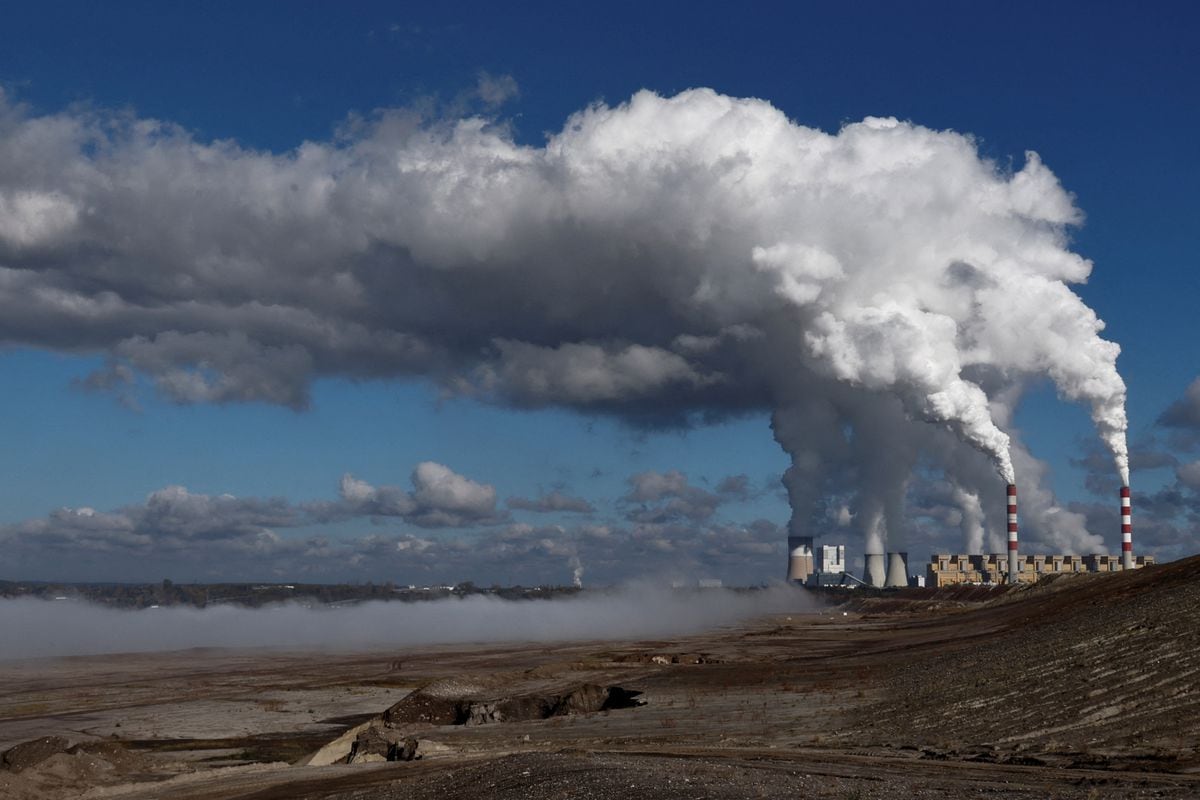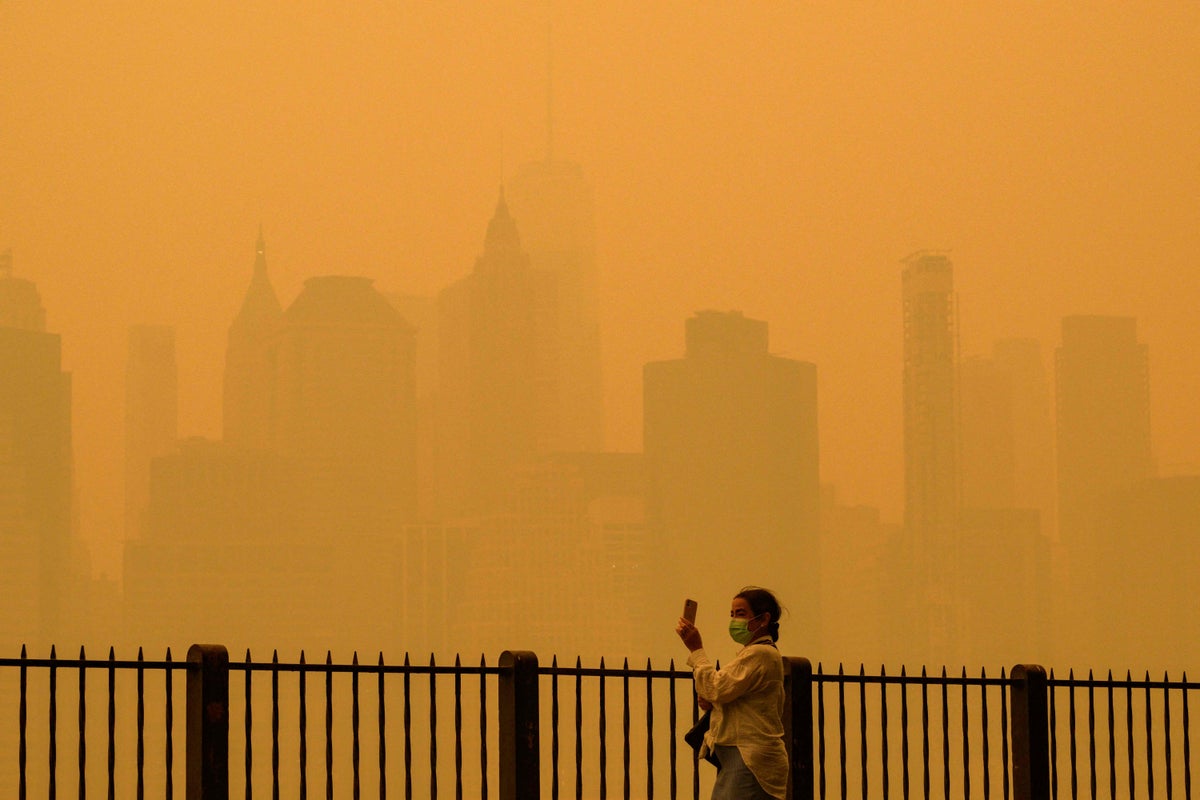Welcome to Tesla Motors Club
Discuss Tesla's Model S, Model 3, Model X, Model Y, Cybertruck, Roadster and More.
Register
Install the app
How to install the app on iOS
You can install our site as a web app on your iOS device by utilizing the Add to Home Screen feature in Safari. Please see this thread for more details on this.
Note: This feature may not be available in some browsers.
-
Want to remove ads? Register an account and login to see fewer ads, and become a Supporting Member to remove almost all ads.
You are using an out of date browser. It may not display this or other websites correctly.
You should upgrade or use an alternative browser.
You should upgrade or use an alternative browser.
Climate Change / Global Warming Discussion
- Thread starter Raffy.Roma
- Start date
-
- Tags
- Energy Environment Policy
Norbert
TSLA will win
In fact, as I said in my previous posts, 2023 is on track to be warmest year on record.
In fact, as I said in my previous posts, 2023 is on track to be warmest year on record.
The temperature deviation of October 2023 measured by NASA confirms that October is the fifth record hottest month in a row in 2023 meaning that 2023 is on track to be warmest year on record.
NASA also points out that this warming trend is caused by human activities.
Last edited:
This video explains how biochar removes CO2 from the atmosphere and also all other features of biochar.
Another video about biochar. In this video an industrial plan to produce biochar in the following years because of its feature of removing CO2 is also shown.
Another video about biochar. In this video an industrial plan to produce biochar in the following years because of its feature of removing CO2 is also shown.
The city of Minneapolis already uses biochar to remove CO2 from the air.
mspohr
Well-Known Member

Five years on, the world is failing to learn the gilets jaunes’ lesson about class and climate | Oliver Haynes
From the reaction to Ulez in London to heat pumps in Germany, eco-policies are still too often felt as sanctions on working people, says Oliver Haynes, a freelance journalist
In his 2022 book Climate Change as Class War, the geographer Matthew Huber argues that most policymaking in the US and similar countries comes from a fairly homogeneous professional class that believes climate policy is about internalising the negative externalities – greenhouse gas emissions – into the market by imposing costs on the consumers of fossil fuels. What this ignores, Huber argues, is questions of power and the distribution of pain.

Report this link explaining the NET ZERO Project and its importance to the purpose of keeping the Temperature Deviation under 1.5 degrees Celsius.

Report this link explaining the NET ZERO Project and its importance to the purpose of keeping the Temperature Deviation under 1.5 degrees Celsius.

Report this link explaining the NET ZERO Project and its importance to the purpose of keeping the Temperature Deviation under 1.5 degrees Celsius.
Actually the target of keeping the Temperature Deviation below 1.5 degrees Celsius has been set by the Paris agreement as it's explained in this video.
A Carbon Sequestration technique uses a substance called BIOCHAR.
Biochar is biologically unavailable, sequestering fixed carbon in the soil for centuries to millennia, providing a tool to absorb net carbon from the atmosphere.
Biochar also lowers the need for fertilizer and slows down water runoff.
In this video you have a more scientific explanation of how biochar implements CARBON SEQUESTRATION (Minute 10 to minute 12).
So not only we have CARBON SEQUESTRATION but also methane CH4, which is a GHG 80 times more powerful than CO2, and nitrous oxide N2O, which is a GHG 265 times more powerful than CO2, are removed from the atmosphere thanks to BIOCHAR.
In this video you have a more scientific explanation of how biochar implements CARBON SEQUESTRATION (Minute 10 to minute 12).
mspohr
Well-Known Member
Excellent!So not only we have CARBON SEQUESTRATION but also methane CH4, which is a GHG 80 times more powerful than CO2, and nitrous oxide N2O, which is a GHG 265 times more powerful than CO2, are removed from the atmosphere thanks to BIOCHAR.
mspohr
Well-Known Member

Texas: Republican-controlled school board votes against climate textbooks
Republican board member condemns photos in some textbooks for being unfairly critical of oil and gas industry
The rejected textbooks included climate-crisis policy solutions, and conservative board members criticized them for being too negative about fossil fuels – a major industry in the state. Texas leads the nation in the production of crude oil and natural gas.
In 2021, Texas experienced an unprecedented winter storm that blanketed much of the state in snow, left millions without power after the electrical grid failed, and resulted in deaths. Houston also bore the wrath of 2017’s Hurricane Harvey, a devastating category 4 hurricane that destroyed homes and buildings while leading to the deaths of more than 100 people in Texas. The state ranks 41st out of 50 in the US for education
mspohr
Well-Known Member

Only 4% of countries propose eliminating multibillion-dollar subsidies for fossil fuels in their climate plans
Global greenhouse gas emissions will peak this decade. However, the U.N. warns that, even with no further increases, this will not be enough to avoid a ‘climate catastrophe’
Every year, governments shower hundreds of billions of public money on the fossil fuel sector around the world. This is despite the fact that coal, oil and gas are mainly responsible for the climate crisis, which has led the planet to an exceptional situation.
That 4% — seven countries in all — doesn’t even represent 4% of the total public aid that is given to the oil, gas or coal industries each year in the world. The report also doesn’t mention which nations have made this commitment. But the important thing isn’t those who do it, but those who don’t. The policy of ending these subsidies is notoriously absent from the climate plans of the main greenhouse gas-emitting powers — that is, China, the United States and India. And, on October 16, the EU authorities presented an update of the bloc’s climate plan, which didn’t include any mention of the elimination of subsidies that fuel the climate crisis.
Quantifying the total amount of aid that goes towards fuel production and consumption is complicated. In 2021, $732 billion dollars of public money in the 82 largest economies in the world went directly to this sector, according to data provided by the OECD. But the IMF — in another report from this past August — reports that public aid for the fossil fuel sector actually reached $7 trillion in 2022. The IMF analysis was based on data from 170 countries. This massive figure also includes a large amount of public money that IMF experts explain has been taken by this sector indirectly. For example, the report includes certain healthcare expenses incurred by states, due to the health problems caused by fossil fuels. In any case, both reports conclude that this aid is substantial and — far from being reduced — has increased significantly since 2020.
SpaceX launches world's 1st satellite that can pinpoint carbon emissions from space
+

 www.wsj.com
www.wsj.com
+

SpaceX’s Second Starship Test Flies Longer—And Ends With Another Explosion
Elon Musk’s deep-space rocket made it further than a previous test flight, achieving separation before losing contact with spacecraft.

Texas: Republican-controlled school board votes against climate textbooks
Republican board member condemns photos in some textbooks for being unfairly critical of oil and gas industrywww.theguardian.com
The rejected textbooks included climate-crisis policy solutions, and conservative board members criticized them for being too negative about fossil fuels – a major industry in the state. Texas leads the nation in the production of crude oil and natural gas.
In 2021, Texas experienced an unprecedented winter storm that blanketed much of the state in snow, left millions without power after the electrical grid failed, and resulted in deaths. Houston also bore the wrath of 2017’s Hurricane Harvey, a devastating category 4 hurricane that destroyed homes and buildings while leading to the deaths of more than 100 people in Texas. The state ranks 41st out of 50 in the US for education
Timely video...
mspohr
Well-Known Member

Net-Zero Emissions Would Save 32,000 Lives and $1 Trillion in the U.S. Alone
The U.S. will see “fewer emergency room visits, fewer asthma attacks” and will save money if it cuts carbon emissions, a new Union of Concerned Scientists analysis says
Cutting carbon emissions sharply over the next three decades will prevent tens of thousands of deaths in the U.S. and save trillions of dollars by reducing air pollutants and easing climate-fueled disasters, according to a report released Thursday. The Union of Concerned Scientists advocacy group estimates that at least 32,000 deaths could be prevented if the U.S. can achieve net-zero emissions by 2050, as renewable energy sources replace fossil fuels that emit toxic chemicals and fine particles causing respiratory illnesses.
The report also says the U.S. can avoid nearly $1.3 trillion in damages from disasters likely to intensify under climate change and save at least $360 billion in health care costs by 2050 if the country reaches net-zero emissions by the same year.
NET ZERO EMISSIONS is best thing to implement!
Net-Zero Emissions Would Save 32,000 Lives and $1 Trillion in the U.S. Alone
The U.S. will see “fewer emergency room visits, fewer asthma attacks” and will save money if it cuts carbon emissions, a new Union of Concerned Scientists analysis sayswww.scientificamerican.com
Cutting carbon emissions sharply over the next three decades will prevent tens of thousands of deaths in the U.S. and save trillions of dollars by reducing air pollutants and easing climate-fueled disasters, according to a report released Thursday. The Union of Concerned Scientists advocacy group estimates that at least 32,000 deaths could be prevented if the U.S. can achieve net-zero emissions by 2050, as renewable energy sources replace fossil fuels that emit toxic chemicals and fine particles causing respiratory illnesses.
The report also says the U.S. can avoid nearly $1.3 trillion in damages from disasters likely to intensify under climate change and save at least $360 billion in health care costs by 2050 if the country reaches net-zero emissions by the same year.
NET ZERO EMISSIONS is best thing to implement!
Actually NET ZERO and CARBON NEUTRALITY have different meanings. In this video the difference between NET ZERO and CARBON NEUTRALITY is explained.
mspohr
Well-Known Member

Pain Compliance Torture Is The Fossil Fuel Industry’s Latest Police Tactic Against Activists
Vilification of protesters, pain compliance torture, anti-protest legislation, and abusive lawsuits: these are some of the insidious tactics that the fossil fuel industry is using in its full-court press against climate activists. Confronted with...
www.dailykos.com
Confronted with strong support for climate action and organized protests against fossil fuel projects, the fossil fuel industry has resorted to using a series of despicable tactics to suppress dissent in the US: 1) characterizing activists as extremists, 2) funding police violence, 3) lobbying for harsh legal penalties for protesting, and 4) filing abusive, resource-sapping lawsuits

Fossil fuel firms spent millions on US lawmakers who sponsored anti-protest bills
About 60% of oil and gas operations protected from protest due to money spent on lobbying, says Greenpeace USA report
Similar threads
- Replies
- 19
- Views
- 1K
- Replies
- 48
- Views
- 4K
- Replies
- 64
- Views
- 4K
- Replies
- 52
- Views
- 33K
- Replies
- 4
- Views
- 12K


